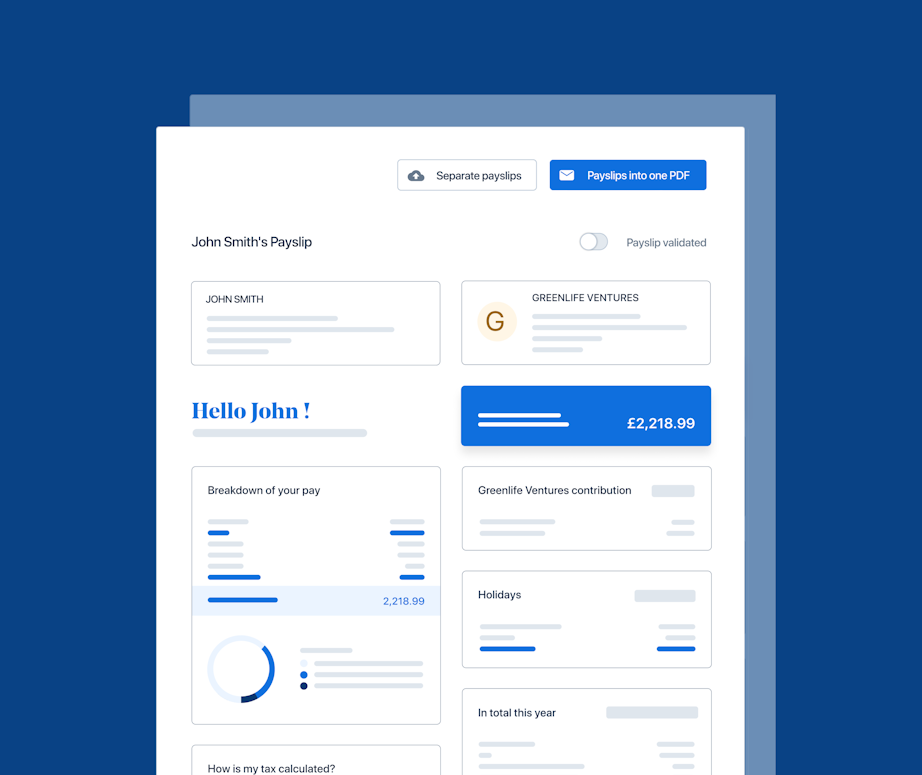5 Types of Employee Benefits To Go Above and Beyond for Employees

By now, we’re all familiar with the basic concept of the standard employee-employer contract; employees clock in their hours, and in exchange for this, they get paid. But there’s more to pay than just cold, hard cash.
There are many different types of employee benefits here in the UK which you can offer across your workforce in addition to the standard compensation of cash. Here’s a refresher on what benefits are and which kinds of benefits you should include in your compensation packs to attract the best and brightest.
What are employee benefits?
When your business sends out a job offer, this, of course, will include a proposed salary figure. But chances are, it will also include details on a range of additional benefits your new hire can look forward to.
Together with their base salary, this ‘package’ of benefits makes up a comprehensive compensation plan covering a plethora of different wants and needs your employees may have. Think health insurance, dental care, a pension scheme, as well as other forms of compensation like stock options - all of these are common benefits employees have come to expect from their employer.
But benefits these days have become even more varied, especially in the UK, to include things like more wellbeing-focused benefits such as coaching or discounts on gym memberships, and other such ‘perks’ like continuous learning stipends or flexible working arrangements. All of these make up the incredible world of benefits that all employers should explore and be familiar with in this modern business era.
Now, let’s take a look at how all these different types of benefits for employees are categorised so you can get a better sense of what to include in your own company’s package.
What’s the difference between mandatory and discretionary benefits?
Before we get into the different types of employee benefits you can offer, it’s important to remember that a benefit will either be statutory or discretionary. In other words, there are some benefits you are legally obligated to provide, while others are optional to include within your compensation package.
Contrary to common opinion, benefits like health insurance aren’t mandatory, but annual leave and pensions are. Let’s take a closer look at the difference between mandatory and discretionary benefits.
Mandatory (statutory) employee benefits
Statutory benefits are those that are mandatory - as a business in the UK, it’s your legal obligation to provide these whether or not you provide any additional ones. In the United Kingdom, employers are required to provide employees with:
Holiday entitlement & pay
All workers are entitled to 5.6 (28 days) holiday on a full-time basis, including bank holidays. Part-time workers will have this holiday entitlement pro-rated based on the number of hours or days they work.
A pension
As an employer, you are legally required to automatically enrol each of your employees into a suitable pension scheme. This process is referred to as auto-enrolment.
Sick pay
Employees who are unable to work for a specific amount of time due to illness or an accident are entitled to statutory sick pay.
Maternity and paternity leave and pay
Employees who are pregnant or who are legally adopting a child are entitled to up to 52 weeks a year of leave. In fact, this leave is also compulsory for employees who have given birth for up to two weeks (four weeks if they’re factory workers).
Discretionary benefits
In addition to these mandatory employee benefits in the UK, employers can choose to offer a wide range of other discretionary or ‘voluntary’ benefits, such as:
Private health insurance
Employee stock options (or share schemes)
Gym memberships
Well-being plans (like coaching or therapy)
Healthy eating discounts
Cycle-to-work schemes
Company cars
Flexible, hybrid or remote working
You may only choose to or be able to offer some of the above. Not all of these benefits will be relevant to your business. For instance, if you mostly hire more urban-based graduates or young professionals, offering company cars might make less sense than if your workforce is based further away. In general, however, the more varied your compensation packages are, the more comprehensive they will be, covering more aspects of employee life.

The five major types of employee benefits
Now that we’ve covered the differences between what is a statutory and voluntary benefit, let’s look at the different types of employee benefits you can provide as part of your compensation packages. As we touched on before, the world of employment perks is a varied one - these come in all different shapes and sizes.
Generally, however, there are five major categories you should be familiar with.
Insurance
This is a broad category that encompasses all kinds of health insurance, as well as life insurance and disability coverage. Employers will usually take out this kind of benefit in the form of group coverage, which covers the entire workforce, and is much more cost-effective rather than having employees sign up for plans individually.
High-quality health or medical insurance is one of the most sought-after types of benefits for employees as this provides coverage not only for their needs but also their families. If you’re keen for your business to offer a robust package of benefits, then life insurance should be high on your list. It’s a great way of showing you care not just for your employees but also for their families.
Having good life insurance in place means that if an employee passes away, they can get reassurance their family will receive a sum to cover funeral and other cost of living expenses. Then, there’s disability insurance, which can be used to cover short or long-term disability or even illness. Under such plans, employees are provided with regular payments for as long as their illness lasts.
Pension plans
For many professionals and workers, retirement is a crucial consideration. A solid pension scheme will help an employee feel more at ease about their future while helping them save up for the kind of retirement they want. Here in the UK, pension contributions allow employees to earn employer contributions while saving and investing a portion of their own wages in the process.
As mentioned before, auto-enrolment is a legal obligation here in the UK - all eligible staff must be enrolled in a pension scheme as soon as they join a company. Employees then have a right to opt out if they so choose or adjust their contribution level. Automatic payroll deductions can streamline and better support this process.
Additional compensation
Beyond their regular salary, you can also create opportunities for your staff to earn more. Commissions, bonuses or performance-based awards are all common ways you can provide this type of benefit, as well as through stock options or profit-sharing plans.
Bonuses can either be contractual (such as for sales positions), or offered out at your company’s discretion. More often than not, these extra payments are dolled out as part of a greater incentive program that you can hone to better motivate employees towards showing up and giving their best.
Bonuses are also a way of increasing morale, though we’d caution against using this as a sole motivator. On their own, additional compensation schemes cannot make up for a poor, toxic culture and can sometimes lead to unhealthy competitiveness. Ensure you’re motivating your team with more than just pounds and pence by supporting their wellbeing and overall engagement.
Paid time off
Whether you’re a business owner or an entry-level employee, we all need a good break every now and again. Employers who stand out understand that their personnel need breaks from time to time to recharge and return to work with a fresh perspective and energy. That’s where paid time off, like paid holiday and sick leave, comes in, but this category also encompasses other types of leave , such as bereavement or sabbaticals.
Here in the UK, paid time off is part of our legislation, but employers can always choose to expand this mandated leave through their own occupational policies. This is an excellent way for your company to stand out and offer employees attractive support beyond what’s simply been legislated. And it’s in going that extra mile that your business is likely to attract talent that is more competent and engaged with your business and its mission.
Fringe benefits
Finally, we come to fringe benefits. While last, they’re certainly not least in terms of importance, though they are optional. This type of benefit that fall outside the most common benefits that UK employees have come to expect.
In short, this is where your HR team can start to have some fun and get strategic and creative. Once you’ve covered the basics of providing your workforce with the more standard benefits they expect - think medical, disability and life insurance, as well as pension plans - you can look to round out your compensation packages with these additional perks.
However, the impact of these additional benefits shouldn’t be understated - they could, in fact, be the difference between an employee accepting an offer or rejecting it for a more enticing compensation pack. Here are a few examples of this type of this kind of employee benefit:
Education stipends
Learning is a lifelong journey. From student loan repayment plans and reimbursing tuition costs to providing an annual budget to spend on online courses, classes or workshops, there are so many ways your company can support employee education. It’s up to your company just how flexible you want to get with this.
Wellness programs & memberships
Wellbeing is an increasingly important topic, both in and outside of the workplace. Fortunately, there’s a lot businesses can do to support wellbeing and, in so doing, enrich the lives of their employees. Gym memberships, in-office meditation or yoga classes, and even an on-site fitness facility can all be offered as benefits that are both healthy and attractive. Healthy in-office snacks are one cost-effective way small businesses can start with this and then expand their offering to include more wellbeing-focused benefits.
WFH costs
Working From Home (WFH) may have been the ‘new norm’ during the pandemic, but it seems it’s decidedly here to stay. At least for businesses who have seen a clear benefit from staff having the flexibility to work when and from wherever they want to. So, if you have a remote or even hybrid working arrangement with your staff, consider covering some of their costs. For example, you can offer a stipend for Working From Home equipment such as an ergonomic chair or larger screen.
Commuting costs
Offering contributions towards an employee’s daily commute can be one way of easing transportation costs. If you have more of a hybrid or full-time in-office set-up, this could be key to attracting candidates who would otherwise opt for a more flexible working contract that would help them save on commuting costs.
Childcare
It’s no secret that childcare is expensive, especially in our post-pandemic world. In fact, childcare costs can be enough to drive many healthy and dedicated employees out of the workforce, as they need to stay home to look after their children - working mothers, in particular, can find themselves in this tricky and challenging position. By contributing towards your employees’ childcare costs, you can reduce staff turnover. If you have the resources, then on-site childcare facilities can be particularly beneficial. You can also consider offering coverage for emergency childcare costs, such as when there are school closures or a child falls ill.
How are different types of employee benefits taxed?
We’ve explored the myriad of benefits your company can offer (and remember, this list isn’t exhaustive). So now let’s get down to brass tax (see what we did there?).
Most benefits will attract some kind of tax treatment; some will have more preferential treatment than others. Usually, this more favourable treatment will be as a result of government policy to encourage employers to support the uptake of schemes like workplace pensions or ultra-low emission vehicles. Some benefits might even be tax-free. Tax-free benefits for employees include things like meals in a staff canteen, workplace parking, hot drinks and water, and mobile phones. Christmas parties are also a tax-free employee benefit if the cost is less than £150.00 per head.
Salary sacrifice is one way of taxing benefits, particularly pensions. Under this arrangement, employees will give up part of their gross pay, pre-tax. In return for this, the employer will provide some sort of benefit, such as matching their contribution to their pension. The result is the employee gets to save on income tax and National Insurance Contributions (NICS), while your company gets to save on NICs, too. Some employers will then ‘reinvest’ these NIC savings to help run the scheme or ‘top up’ employee pension pots.
It’s important to consider all of the implications involved with salary sacrifice, such as its impact on universal credit or the national minimum wage rates.
Wrapping up
Companies used to just take out a health insurance and pension plan and call it a day. But those days are falling further and further behind us as the modern job candidate seeks out positions that offer not just fair compensation but a basket of supportive benefits to go with this.
If you want to compete in today’s job market, then offering benefits that bolster employee mental health, wellbeing, financial security, and work-life balance is a must. Offering benefits that your business can afford but that are also varied can help you put together comprehensive compensation packages that win out.
How To Work Out Hourly Rates In The UK - An Employers' Guide
Recruitment Process Guide - Stages, Selection, Automation
Employee Contracts - A Guide For UK Businesses
Part Time Workers' Holiday Entitlement - Guide & Calculator









